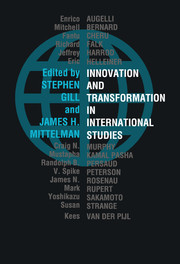Book contents
- Frontmatter
- Contents
- List of contributors
- Preface
- Acknowledgements
- Part I Rethinking and remaking the roots of global social and political theory
- 1 Transformation and innovation in the study of world order
- 2 Consciousness, myth and collective action: Gramsci, Sorel and the ethical state
- 3 The critical realist tradition and the demystification of interstate power: E. H. Carr, Hedley Bull and Robert W. Cox
- 4 Ibn Khaldun and world order
- Part II Political economy: the social and ecological anatomy of transformation
- Part III Transformation, innovation and emancipation in global political and civil society
- Part IV Reflections on global order in the twenty-first century
- References
- Index of names
- Index of subjects
4 - Ibn Khaldun and world order
Published online by Cambridge University Press: 05 July 2011
- Frontmatter
- Contents
- List of contributors
- Preface
- Acknowledgements
- Part I Rethinking and remaking the roots of global social and political theory
- 1 Transformation and innovation in the study of world order
- 2 Consciousness, myth and collective action: Gramsci, Sorel and the ethical state
- 3 The critical realist tradition and the demystification of interstate power: E. H. Carr, Hedley Bull and Robert W. Cox
- 4 Ibn Khaldun and world order
- Part II Political economy: the social and ecological anatomy of transformation
- Part III Transformation, innovation and emancipation in global political and civil society
- Part IV Reflections on global order in the twenty-first century
- References
- Index of names
- Index of subjects
Summary
The world of the things that come into being as the result of action, materialises through thinking.
(Ibn Khaldun, 1958, II: 413)The promise and challenge of globalisation, with radical shifts in global economic activity, rearticulations in political space, and the emergence of new forms of cultural identity portend both opportunities and perils for International Relations theory. Although existential dislocations may yield theoretical innovation, established patterns of thought – or what can be termed here the dominant orthodoxies of neo-realism and liberal institutionalism in International Relations theorising – continue to discipline the imagination of those with power and privilege.
Against this dialectic of transformation in the world order and dominant thinking in International Relations lies the promise of an alternative approach. To realise this promise, it is important to identify fresh avenues for both innovation and emancipation. Appreciation of various civilisational complexes and their notions of world order in their present manifestation and reality is needed to fully understand and to reflect upon real historical change. Such complexes should not be understood as entities that are outside of the driving forces of historical transformation or assigned the disparaging status of ‘pre-history’ – they are part of the movement of history. Also, to fully appreciate, for example, the complexities and contradictions of Islamic aspects of civilisation may help free our imagination from the cultural fetters associated with prevailing orthodoxies. This would then enable us to move towards a more universal conversation on international relations.
- Type
- Chapter
- Information
- Innovation and Transformation in International Studies , pp. 56 - 70Publisher: Cambridge University PressPrint publication year: 1997
- 7
- Cited by



